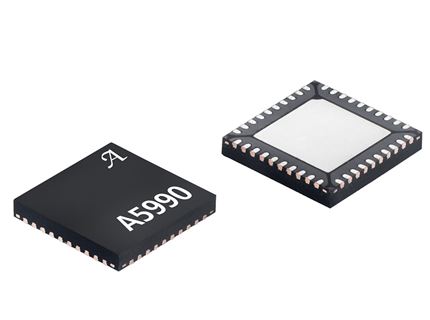Allegro MicroSystems, LLC Introduces New Quad DMOS Full Bridge PWM Motor Driver IC

Designed with Adaptive Percent Fast Decay (APFD) to Reduce Current Ripple for Improved Microstepping Accuracy and Lower Audible Noise
Allegro MicroSystems, LLC introduces a new quad DMOS full-bridge driver IC capable of driving up to two stepper motors or four DC motors. Each full-bridge output is rated up to 1.6 A and 40 V. Allegro’s A5990 includes fixed off-time pulse-width modulation (PWM) current regulators, along with 2- bit nonlinear DACs (digital-to-analog converters) that allow stepper motors to be controlled in full, half, and quarter steps, and DC motors in forward, reverse, and coast modes. High resolution microstepping control is possible via independent current control reference voltage inputs for each full bridge. The A5990 PWM current regulator features externally adjustable off-time to adapt the current control to supply voltage and motor parameters—each bridge pair can be adjusted independently. The A5990 also features an adaptive percent fast decay (APFD) option which automatically and continuously adjusts the fast decay portion of the off-time to provide increased step accuracy, lower current ripple, and reduced power dissipation. Alternatively the A5990 can be set to use the Allegro™ patented mixed decay mode with fixed percent fast decay of 30.1%.
Internal synchronous rectification control circuitry is provided to improve power dissipation during PWM operation. To minimize power consumption when not in use, the A5990 can be put into a low current Sleep Mode. Protection features include thermal shutdown with hysteresis, undervoltage lockout (UVLO), over current (OCP) and crossover-current protection. Special power-up sequencing is not required.
The A5990 is supplied in an EV package, a 6 mm × 6 mm, 40-pin QFN package with a nominal overall package height of 0.90 mm. The package is lead (Pb) free, with 100% matte-tin leadframe plating. It is targeted at the dual axis multiple motor systems including CCTV (pan and tilt), 3D printing, point of sale (receipt and lotto printers), office automation (laser printers, copiers, etc.), medical (diagnostic systems), and the industrial automation market (ATMs and pick and place machines).
